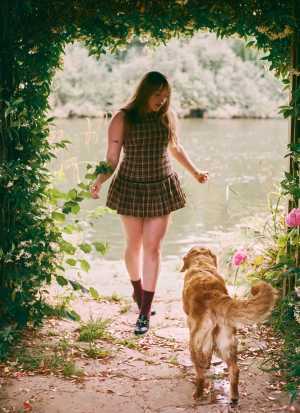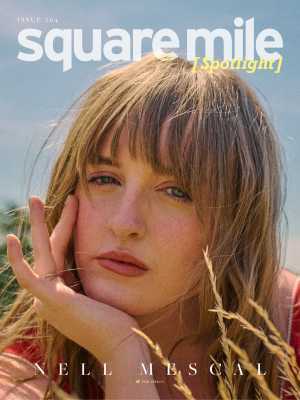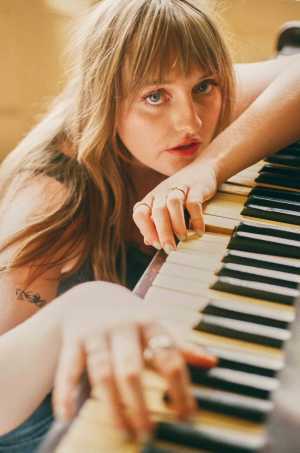In every romantic relationship, there comes the moment. You know the one, where everything seems to reside in the grey area, and the relationship’s future (or lack thereof) hangs on a knife edge. In your desperation, you bargain with the idea of opening yourself up, weighing the scales of vulnerability against self-protection.
It’s this make-or-break instant that bedroom-pop singer-songwriter Nell Mescal aims to encapsulate on her new EP The Closest We’ll Get – the lead single of which eloquently summarises it as, “If not now, then it’s forever.”
When we meet in a café in Finsbury Park – Nell’s first neighbourhood when she moved to London from Ireland, just after turning 18 – she chats with candour about her recording process, six months after she left a situation she doesn’t quite describe as “dating”, confessing that “‘break-up’ is such a kind word for it.”
“To me, the EP is really, really heartbreaking and really visceral. But I was smiling the whole time when we were recording it,” she says, reflecting on how the songs would have felt “so different” if they’d been recorded even a year earlier. After some time had passed, she tells me, “If you want to be sad, you can be sad about it, but if you want to lean into other emotions, you can absolutely surpass it.”
The Closest We’ll Get is narrowly focused on a specific romantic relationship (or, more accurately, ‘situationship’), which is a new direction for the 22-year-old. Much of her previous music, and especially her 2022 breakout single ‘Graduating’, took platonic relationships as its subject, luxuriating in the distinct late-teen experience of feeling like you’ve been left behind, the only one in a once close-knit group to still be emotionally invested in the past.

The nearest she’s come to a quote-unquote ‘break-up song’ was ‘Killing Time’ from her debut EP Can I Miss It For A Minute?, a frenetic testament to an intense love between two people, which ended in a night “bottled up like a bad dream”. I’m not the first journalist she’s talked to who’s mistaken that song for being about romance rather than friendship. Still, writing about romantic relationships feels like a different beast, and a more confronting one.
“It was really terrifying for me,” she says, “because I was like, ‘Oh my God, now my parents have to listen to how much I care about this other person.’” The creative possibilities seem to outweigh this fear. Writing deeply autobiographical music has made her almost excited to find out what will happen to her as she navigates her twenties. “I hope nothing too heartbreaking,” she laughs.
Whether she’s writing about romance, friendship or anything in between, Nell’s songs continue to be a way for her to “try to figure out what’s going on in my life”. She praises her frequent collaborators not only for how they push her vocally and musically (“You meet someone new and they sit in front of the piano and they play chords that you never play.”), but also for how they sometimes help her uncover new meanings in her lyrics.
New song ‘Middle Man’, for instance, a plea to a distant lover backed by percussive piano chords, desperately asks its addressee to “cut out the middle man” and communicate directly – to rip off the proverbial band-aid. The process of recording and re-recording ad infinitum helped her realise that the person addressed in the song, the one who needed to push the button and end things, was not the person she’d been dating. It was her.
There’s a more settled quality to Nell’s newer music, a wistfulness in place of her first EP’s unresolved anxieties, and that might come from the life she’s built for herself in London. A tattoo on her forearm reads ‘fainleog’, the Irish word for ‘swallow’, which can also mean something like ‘wanderer’ – those who migrate, like birds. While she does reminisce fondly about a pub around the corner she says serves the best Guinness in London, and attributes the heavy emotions in her songs to her Irishness, there’s a warm familiarity in how she talks about her new home.
“I never planned to [make the move to London],” she says. “If I could go back, I would be a bit kinder to myself, flown home to see my parents a bit more, because I was so adamant about proving I could make it work here.” Four years later, and she’s eagerly relating lists of her favourite coffee shops, describing her life in London as “a wonderful community, somewhere that feels like coming home when I get back from a tour or a writing trip”.

Now, she’s based in Kentish Town, in a flat she’s shared with her elder brother Donnacha for the last two years. When Donnacha moved to the UK after a stint in New York, she was a typically smug younger sibling in the big city – “I’ve lived here for years and you’ve never lived here before.”
Of course, the more famous sibling is Nell’s other elder brother, actor and Hampstead Heath denizen Paul Mescal (Donnacha, by contrast, works in recruitment). She’s spent years fighting nepo sibling allegations in interviews, justly so as she’d already spent time with producers in England and made inroads into a career in music before Paul got his big break in Normal People, back in 2020.
While she does offer a tantalising remark that she’s accustomed to hearing both her brothers chat about their romantic lives, assuaging her shyness about writing about her own break-up on The Closest We’ll Get, she isn’t here to get into celebrity gossip – however intriguing it might be. Some of her earliest performances were opening slots for Phoebe Bridgers, her brother’s ex.
Instead of giving the tabloids something to plaster relentlessly across their pages, she talks about her family – her brothers, mother Dearbhla, and father Paul Snr – as emotional anchors in her life. Despite a discography that relates the traumas of her time at school – friend break-ups and bullying, as well as a back surgery aged 14 – her memories of that time now are “mostly really beautiful”.
“It wasn’t easy, but then is it really easy for anyone? I’m so glad that they’re my parents, because a lot of the time when I was going through something, it didn’t feel like I was going through it, because I had such a great support system at home.”

She also credits her ambition, the ambition that led her to take the plunge and move to London, to her parents in different ways. “My mum is ‘Oh, my God, anything is possible’. But my dad is ‘Yes, it is. But how are we gonna get there?’”
Pre-surgery, her ambitions were always torn between music and Gaelic football, with a mixed extracurricular diet of hockey, tennis and Girlguiding on the side. The environment at home was creative, with Paul Snr playing guitar (“I stubbornly told him I’d learn on my own”), and Dearbhla writing prose, including lengthy birthday cards which Nell still pins on her wall. And then, of course, there was her love of musical theatre, especially Annie, which influences her vocal technique to this day.
This all sounds like a wholesome childhood, far removed from the pernicious influences of social media in its infancy that affected so many teens in the early 2010s. Conversely, though, Nell wishes she’d participated more in the online fan culture of the era. “I had posters of One Direction on my wall, but I wasn’t online. That was a good thing, but when I see people who relate so much to an artist, and then meet someone who relates in that exact same way, it’s such a lovely feeling.”
She speaks fondly of interactions with fans who have met online and attended every show on her tour, developing inside jokes with her along the way: “I’ve accidentally kicked over my water bottle at every show, so [the two fans who attended every show] got me a new bottle on the last night.”
Nell’s warmth and positivity do not mean that any grief or pain is solely a distant memory. Her mother’s cancer, for instance, which she was diagnosed with in 2022 on the same day as Paul’s first Oscar nomination, only went into remission last year. But there’s an equanimity to her, the sort of acceptance of life’s peaks and troughs we’re promised will take hold of us when we turn 25 and our frontal lobe becomes fully developed.

“Even in the darkest times, there were amazing moments. When everything’s going well, I think, ‘What’s going to go wrong?’ But when everything’s going wrong, I’m like, well, ‘What’s about to go really right?’” Will this circumspect maturity and optimism ever manifest itself in her music? “I really struggle writing happy songs. I find it so cringe. I’ll listen to a happy song and I’ll try and write [something like] that, and then I can’t; something stops me.” Her most recent attempt was a song about her family – her mother’s reaction? “My heart is breaking.”
She’s shy when her feathery vocals receive comparisons to contemporaries like Tate McRae and Billie Eilish, but the one comparison she does want to earn is to American musician Adrianne Lenker. On her 21st birthday, Nell cried listening to Lenker perform live so much she had to blow her nose into a tote bag. “Every time I put on an Adrianne song, I immediately feel warm, and I hope people feel that way listening to me,” she says.
‘Sweet Relief’ is perhaps the closest her new EP comes to this warm feeling – a sigh of the titular relief, the feeling of closure and of knowing a relationship ended exactly when and how it was meant to. “Even when I’m writing about sad stuff,” she says, “I want to have some sort of line that is not the sad thing, something that has some hope.”
For now, the unambiguously happy songs can wait. Nell will be revelling in the more bittersweet moments in life, the grey areas, and maybe, just maybe, a little hope might just slip through the cracks.
View on Instagram
The Closest We’ll Get comes out on 24 October. She will tour the UK throughout November.
